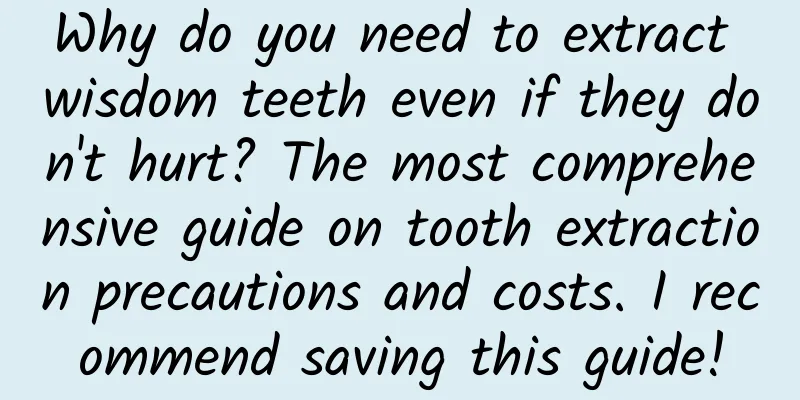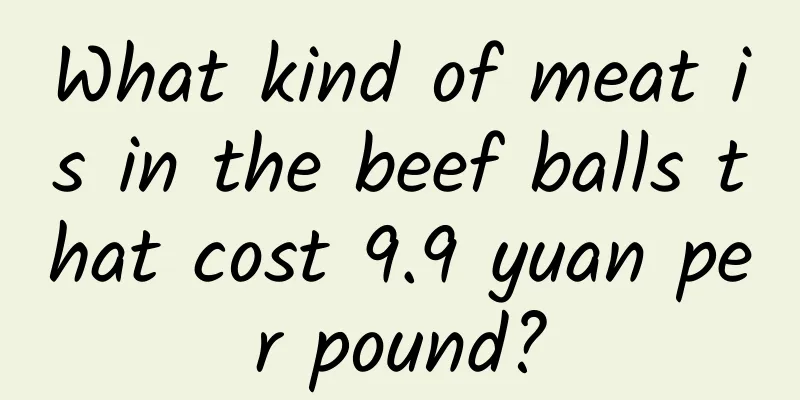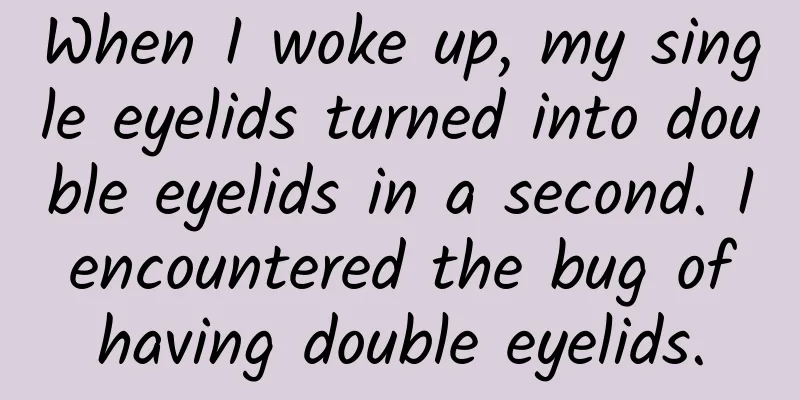Why do you need to extract wisdom teeth even if they don't hurt? The most comprehensive guide on tooth extraction precautions and costs. I recommend saving this guide!

|
Recently, a topic "A woman's wisdom teeth repeatedly became inflamed and her cheeks became rotten" became a hot topic. A woman in Yangzhou had a jaw cyst because she had delayed having her wisdom teeth removed for a long time. Eventually, the abscess pierced her left cheek. This news instantly sparked heated discussions on the Internet, and there was an uproar. Netizens also complained in the comment section, complaining about their own experience of being "tortured" by wisdom teeth. "Oh my god, this is too much to bear. Toothache is really painful." "I'm having a root canal treatment, and I can already smell the drilling tool in the air..." "The doctor said my wisdom teeth are growing well and will not affect other teeth. I am so lucky." Many friends have been troubled by whether to remove their wisdom teeth. After all, wisdom teeth come out in waves, and they don’t want to remove them when they are not painful... Let's take a look at this today: Should wisdom teeth be removed? What are the dangers of not removing them? What are wisdom teeth? Wisdom teeth, officially known as third molars, are the last molars to erupt. Usually there are 4 of them, symmetrical up and down, but there are also cases where there are less than 4 or no wisdom teeth. Wisdom teeth usually grow out after the age of 16. At this time, the person's mind has matured and has a certain degree of wisdom, so they are called wisdom teeth. How to determine whether you have wisdom teeth? It's very simple. Just take a mirror and count how many teeth you have. Generally speaking, there are 28 normal teeth, plus 4 wisdom teeth, a total of 32. If you have more than 28 teeth, it means you have wisdom teeth. However, there are also cases where wisdom teeth have grown but have not erupted. In this case, an X-ray is needed to see it. Why do dentists recommend removing wisdom teeth? Due to the special location of wisdom teeth, cleaning and treatment can cause many problems. They are difficult to clean with daily brushing, which can easily lead to tooth decay, pain and infection. Moreover, wisdom teeth often have insufficient space to erupt, which can easily invade adjacent teeth and cause severe pain. Some wisdom teeth may over-erupt and elongate, which may affect facial occlusion; some wisdom teeth may not erupt enough and become impacted teeth, causing malocclusion, pericoronal infection, and difficulty opening the mouth. (Inflammation of wisdom teeth causes pericoronal infection) Which wisdom teeth need to be extracted? What are the dangers of not extracting them? 1. Incompletely erupted wisdom teeth: This type of wisdom tooth is buried in the gums, which can easily cause periodontitis and affect the life of the second molars. It is recommended to extract them. It is better to have a short pain than a long one! 2. Wisdom teeth with caries: If there is only slight decay on the occlusal surface, you can choose to fill the tooth; if there is decay on the adjacent surface or the decay is very deep and requires root canal treatment, it is recommended to extract it to avoid future troubles. 3. Anteriorly tilted impacted wisdom teeth: That is, the wisdom tooth is on the second molar at an angle of about 45 degrees. If this kind of wisdom tooth is not extracted, it is easy to cause lesions in the adjacent teeth. In severe cases, the wisdom tooth and the second molar need to be extracted, which will seriously affect our chewing function and even cause pulpitis. 4. Wisdom teeth that are too tightly arranged: If there is insufficient space for the wisdom teeth to grow and the teeth are arranged too tightly, more serious symptoms such as swollen gums and tooth pain will occur. The wisdom teeth should be removed as soon as possible after the inflammation subsides. 5. No opposing wisdom teeth: If there is no wisdom tooth to counteract the wisdom tooth, the over-eruption of the wisdom tooth will affect the bite, causing swelling and pain in the opposite gum. And over time, it may also cause uneven faces. 6. Wisdom teeth treated with orthodontics: For many people, the first step to correcting teeth is to extract teeth. In fact, this is to prevent crowding of front teeth or recurrence of deformity after orthodontic treatment. It is generally recommended to follow the doctor's advice and extract them as soon as possible. Which wisdom teeth do not need to be extracted? First of all, it should be clarified that not all wisdom teeth need to be extracted. If the teeth erupt normally, The position and direction of the wisdom teeth are normal. You can bite normally without pain or risk of infection. Then there is no need to remove it. Six common questions about wisdom tooth extraction 1. What preparations are needed before wisdom tooth extraction? (1) Women should avoid menstrual period; (2) Be in good health; (3) Complex teeth should be extracted in the morning if possible; (4) Do not extract teeth on an empty stomach; (5) X-rays must be taken before tooth extraction; (6) Pregnant women are advised to remove the implant before pregnancy. 2. Can removing wisdom teeth help slim your face? Wisdom tooth extraction has nothing to do with face slimming. The main factor that affects the width of the lower part of the face is the shape of the mandible, such as the convexity of the mandibular angle and the protrusion of the outer oblique line of the mandible. However, wisdom teeth grow in the mandible and do not support the face, so they have no obvious effect on the width of the face. Therefore, removing wisdom teeth will not be very effective in slimming the face. 3. Can I have my wisdom teeth removed during pregnancy? Many women may never experience pain from their wisdom teeth, but dentists may still recommend having them removed before pregnancy. This is because when a woman is pregnant, the hormones in her body will change, and wisdom teeth that never hurt may start to ache. In addition, it is not recommended to extract teeth in the first three months and the last three months of pregnancy. If the wisdom tooth becomes inflamed during pregnancy, the doctor will only do some simple treatments such as flushing, and the expectant mother will have to rely on herself to get through it. If it further develops into pericoronal abscess or even interstitial infection, it will be quite troublesome and may even affect the baby's growth and development. 4. Can all four wisdom teeth be removed at once? Some people think that since it hurts anyway, they might as well just get through it all at once and remove three or four wisdom teeth at once! It’s cruel, but not recommended! Because normally the upper and lower wisdom teeth on one side are removed at a time, the time to remove the wisdom teeth on the other side will be determined based on the patient's postoperative reactions such as pain, swelling, and limited opening. If the postoperative reaction is severe, a wait of about 2 weeks is required; generally speaking, a wait of about 1 week is required before removing the other side. 5. Should wisdom teeth be extracted in the morning or in the afternoon? You can also have your teeth extracted in the afternoon, but the best time to do it is in the morning. Because after the tooth is extracted, there will be trauma, and some teeth are more complicated and difficult to extract, so there are more and more serious complications after tooth extraction, such as bleeding, infection, swelling, pain, etc. If the tooth is extracted in the morning, if the above symptoms occur, you can go to the hospital for treatment in time. However, if the tooth is extracted in the afternoon and the above complications occur, the dental department generally does not have nighttime emergency rooms, and you may not be able to seek medical treatment in time. Missing the best treatment time may cause more serious consequences. 6. How much does it cost to extract wisdom teeth? (Depending on the difficulty, time, and equipment of the extraction, it is about 200 yuan to 2,000 yuan) "Doctor, why does he only charge 200 for wisdom tooth extraction, but mine costs 2,000?" The cost of wisdom tooth extraction varies, which must be a confusion for many people. In fact, the price of wisdom tooth extraction is determined by factors such as the difficulty, time, and instruments used in the extraction. The deeper the wisdom tooth is, the more difficult it is to remove. Likewise, the longer the tooth extraction takes, the more energy the doctor will consume; If you encounter difficult wisdom teeth, high-risk equipment will be used and the cost will increase. In short, the cost of wisdom tooth extraction is composed of the difficulty + doctor's skills + drugs and equipment. It depends on whether your wisdom teeth are "obedient". Here are some photos of common impacted wisdom teeth. You can check which one you like. If you have any questions, comments, or suggestions about wisdom teeth, please leave a message in the comment section. |
<<: “Sea Wolf crashed into the mountain”, is it really because the active sonar was not turned on?
>>: Understanding Insulated Bearings
Recommend
The super weapon of element synthesis! See what is the key to artificially synthesizing elements →
Welcome to Science Popularization China’s special...
How to promote a new App?
Since I often write about App promotion, friends o...
Brand crisis public relations trends in 2021!
It has to be said that brand crisis public relati...
CITIC Securities 2021 Research Methods Training (Shanghai Station)
CITIC Securities 2021 Research Methods Training (...
Are water-heated blankets and zoned control just a waste of money? How to choose an electric blanket?
It's the season again when getting up require...
Electric Technology Car News: Geely's new car Lynk & Co debuts. Why do domestic cars focus on promoting high-end sub-brands?
In the past two years, domestic brands have been ...
5 steps to make your Douyin operation more efficient
If you ask Aunt Lisa, does it cost money to make ...
China Mobile's terminal marketing will only invest in 4G next year and cancel 2G/3G subsidies
One million 4G base stations, 250 million 4G user...
A must-read for new media operators | October’s holiday hot spots: National Day, Double Ninth Festival and Halloween
The author of this article will share with you th...
Do peanuts promote cancer metastasis? I advise you to eat them this way to be safe!
This article was reviewed by Pa Li Ze, chief phys...
8 new media operation suggestions that newcomers must know!
As a writer who has just come into contact with n...
Website seo diagnostic report, website search engine optimization diagnostic analysis report!
A good website SEO diagnosis report can be regard...
3 user growth techniques that cannot be ignored when bringing in new users from old customers!
The goal of user growth can be achieved by stimul...
oCPC costs remain high? Come and try this method!
When delivering information flow, especially runn...









